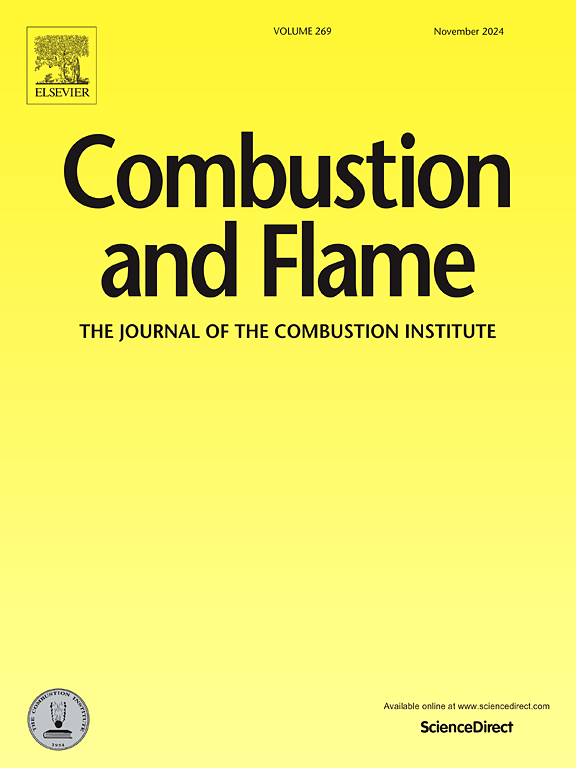Deep reinforcement learning for adaptive control of thermoacoustic instabilities in a lean-premixed methane/hydrogen/air combustor
IF 6.2
2区 工程技术
Q2 ENERGY & FUELS
引用次数: 0
Abstract
Thermoacoustic instabilities are a challenge in the design and operation of combustion systems. Addressing this challenge is becoming even more critical with the development of fuel-flexible combustors capable of operating with hydrogen and other sustainable fuel sources. While active control is a well-known method for damping combustion instabilities, identifying appropriate control parameters becomes increasingly complex in the presence of changing fuel composition and operating conditions. In this work, we present a model-free deep reinforcement learning (RL) technique to adaptively tune an active control system. We demonstrate that the RL-based active control system is able to adaptively suppress thermoacoustic instabilities over an extended range of operating conditions with minimal training. The demonstration is performed on a laboratory-scale bluff-body-stabilized premixed methane/hydrogen/air flame, at equivalence ratios ranging from 0.5 to stoichiometric, and with up to 80%vol hydrogen in the fuel. After training the RL system on a single operating condition, combustion instabilities can be mitigated over the entire operating range of the burner. Extending the training to three additional operating conditions allows the RL control system to fine-tune its policy and further reduce thermoacoustic instabilities, achieving a sixfold reduction in the acoustic source term over most of the operating range. We observe a reduction of up to 40 dB in acoustic pressure over 50% of the operating range. The proposed approach offers a promising path towards more efficient, adaptive control systems for thermoacoustic instabilities, demonstrating the potential of RL to address the operational challenges of fuel-flexible combustion systems.
Novelty and Significance Statement
We show the first experimental demonstration of a reinforcement learning-based control method for thermoacoustic instabilities. The experiments are performed on a laboratory-scale premixed methane/hydrogen/air bluff-body burner, which exhibits strong combustion instabilities over a wide range of operating conditions. Building upon a conventional control system, which utilizes a pressure sensor, an acoustic driver, and a gain- and phase-shift controller, the reinforcement learning-based controller is able to dampen instabilities over the entire operating range. This is achieved while training the controller on a single operating condition. Extending training to a total of four distinct operating conditions further fine-tunes the control policy and yields an additional reduction in the acoustic pressure amplitude. This research illustrates the potential of reinforcement learning for robust control in combustion systems - capable of addressing the challenges of complex combustion physics, adapting to unseen conditions, and merging information from heterogeneous sensors.
贫预混甲烷/氢/空气燃烧室热声不稳定性的深度强化学习自适应控制
热声不稳定性是燃烧系统设计和运行中的一个挑战。随着能够使用氢和其他可持续燃料的燃料柔性燃烧器的开发,解决这一挑战变得更加重要。虽然主动控制是一种众所周知的抑制燃烧不稳定性的方法,但在燃料成分和操作条件不断变化的情况下,识别合适的控制参数变得越来越复杂。在这项工作中,我们提出了一种无模型深度强化学习(RL)技术来自适应调整主动控制系统。我们证明了基于rl的主动控制系统能够在最小的训练条件下自适应地抑制热声不稳定性。该演示是在实验室规模的崖体稳定预混甲烷/氢气/空气火焰上进行的,当量比从0.5到化学计量,燃料中含有高达80%体积的氢气。在单一操作条件下训练RL系统后,燃烧不稳定性可以在燃烧器的整个操作范围内得到缓解。将训练扩展到三个额外的操作条件,允许RL控制系统微调其策略,并进一步减少热声不稳定性,在大部分操作范围内实现声源项减少六倍。我们观察到,在50%的工作范围内,声压降低了40 dB。提出的方法为热声不稳定性提供了一条更有效的自适应控制系统,展示了RL解决燃料柔性燃烧系统操作挑战的潜力。新颖性和意义声明我们展示了基于强化学习的热声不稳定性控制方法的第一个实验演示。实验是在实验室规模的甲烷/氢/空气预混合钝体燃烧器上进行的,该燃烧器在广泛的工作条件下表现出很强的燃烧不稳定性。在传统控制系统的基础上,利用压力传感器、声学驱动器、增益和相移控制器,基于强化学习的控制器能够抑制整个工作范围内的不稳定性。这是在单一操作条件下训练控制器时实现的。将训练扩展到总共四种不同的操作条件,进一步微调控制策略,并进一步降低声压振幅。这项研究说明了强化学习在燃烧系统鲁棒控制中的潜力——能够解决复杂燃烧物理的挑战,适应未知条件,并融合来自异构传感器的信息。
本文章由计算机程序翻译,如有差异,请以英文原文为准。
求助全文
约1分钟内获得全文
求助全文
来源期刊

Combustion and Flame
工程技术-工程:化工
CiteScore
9.50
自引率
20.50%
发文量
631
审稿时长
3.8 months
期刊介绍:
The mission of the journal is to publish high quality work from experimental, theoretical, and computational investigations on the fundamentals of combustion phenomena and closely allied matters. While submissions in all pertinent areas are welcomed, past and recent focus of the journal has been on:
Development and validation of reaction kinetics, reduction of reaction mechanisms and modeling of combustion systems, including:
Conventional, alternative and surrogate fuels;
Pollutants;
Particulate and aerosol formation and abatement;
Heterogeneous processes.
Experimental, theoretical, and computational studies of laminar and turbulent combustion phenomena, including:
Premixed and non-premixed flames;
Ignition and extinction phenomena;
Flame propagation;
Flame structure;
Instabilities and swirl;
Flame spread;
Multi-phase reactants.
Advances in diagnostic and computational methods in combustion, including:
Measurement and simulation of scalar and vector properties;
Novel techniques;
State-of-the art applications.
Fundamental investigations of combustion technologies and systems, including:
Internal combustion engines;
Gas turbines;
Small- and large-scale stationary combustion and power generation;
Catalytic combustion;
Combustion synthesis;
Combustion under extreme conditions;
New concepts.
 求助内容:
求助内容: 应助结果提醒方式:
应助结果提醒方式:


